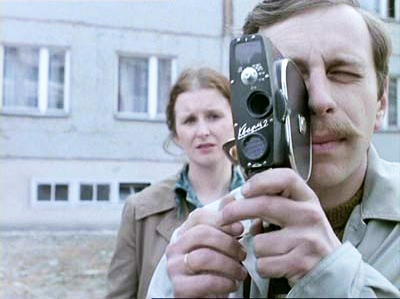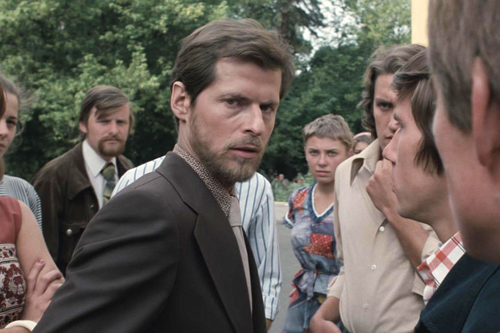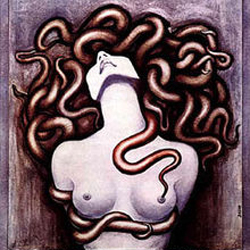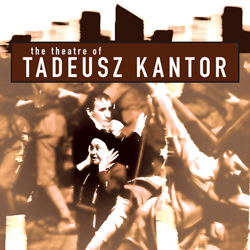 The following essay by Erica Levin is the second in this six-part column for CR. Developed during Polish Movie Nite (PMN), a series of film screenings at The Polish Club in San Francisco, these texts aim to introduce a wide variety of films that might be classified “Polish.”
The following essay by Erica Levin is the second in this six-part column for CR. Developed during Polish Movie Nite (PMN), a series of film screenings at The Polish Club in San Francisco, these texts aim to introduce a wide variety of films that might be classified “Polish.”
Following Julian Myers’ and Chris Fitzpatrick’s analysis of “The Promised Land” and director Andrzej Wajda’s 1970s version of early capitalism pictured therein, the following essay zips us decades forward to the 1970s. Media art historian Erica Levin presents two films by Krzysztof Kieślowski, the documentary short “The Office” (1966), and the feature-length film “Camera Buff” (1979), analyzing the complex politics and strategies of picturing labor in Polish cinema. Her essay will be succeeded by other texts produced for the PMN series in upcoming issues of Cosmopolitan Review.
– JSz
“Camera Buff” (Amator) is a film about filmmaking in Poland. It introduces us to a bureaucratic film culture where documentaries made by factory-sponsored cine-clubs are discussed with the utmost seriousness and may even earn film festival prizes. Directed by Krzysztof Kieślowski in 1979, “Camera Buff” means to gently mock the pieties of this Communist cine-culture, but the bite of its satire is sometimes overwhelmed by the film’s erratic emotional tone, which is funny in one moment, and surprisingly overwrought or even tender in the next. Filmmaking is an activity, even a kind of labor, that Kieślowski has difficulty comfortably lampooning. I would even say that the relationship of cinema to work is central for Kieślowski: What kind of work is it? What does one do when making a film? What happens when it is transformed from an activity animated by love into a job? And what of this love? What does it promise, and at what price? Remember, of course, that Kieślowski poses these questions in the context of a cinema culture for which “the worker” occupies a historically privileged role.
Kieślowski is associated with what critics have called “the Cinema of Moral Anxiety,” a movement that flourished in Poland between 1974 and 1980. Filmmakers of this post-war generation were educated at State-run film academies, subject to all manner of bureaucratic pressures and the threat of censorship, but also given a relatively substantial amount of autonomy. This was a moment when socialist realism was on the verge of giving way to something more like social realism. Upon graduating, Kieślowski directed documentaries for more than a decade before shifting his focus to feature filmmaking. In interviews he talks about his desire to show life, not as it was imagined by the State, but as it really was.
Tonight’s feature is preceded by one of his earliest documentary efforts from 1967 entitled “The Office”. Here Kieślowski’s camera captures nothing so much as the absurdities of bureaucracy, the way it comically hampers getting anything done, but also how it weighs heavily on the spirit of anyone entering its sphere. If the image of the heroic worker epitomizes the socialist realist cinema of the late 1940s and early ’50s, then Kieślowski’s cinema evolves out of an impulse to show the other side of life and labor in Communist Poland. While films like the 1951 “Destination: Nowa Huta!” are full of youthful, bare-chested Polish construction workers setting out to build a new workers’ paradise, Kieślowski’s characters are decidedly more human, fallible, funny, but also flawed. He pictures the endless contortions of body and soul that everyday life in Poland seemed to require. Another of his early documentary films focuses on Łódź, a city whose many limbless inhabitants, victims of industrial and traffic accidents in the dangerous urban environs, were a source of perverse fascination for the filmmaker.
In “Camera Buff,” Kieślowski again trains his camera on an exceptional body – one that stands out against the norm. The film’s main character, Filip, makes a film called “Worker,” about a dwarf, or perhaps better, a man of short stature, who has been at the factory since it opened. Though Kieślowski talks of having wanted to make a film featuring a similar protagonist, one wonders how his film might have differed from Filip’s, which is too sentimental to be truly great. It’s as though in order to realize this film, Kieślowski had to frame it in terms of the unhappy story of our amateur filmmaker.
So how do you become a troubled camera buff in Communist Poland? If you are Filip Mosz (played by the delightfully comic Jerzy Stuhr – who co-wrote much of the film’s dialogue) you buy an 8mm camera to film your newborn daughter, knowing full well that it will cost you the equivalent of two months’ salary. We are made to understand what a rare novelty such a camera might have been in small-town Poland at this time when Filip’s purchase provokes the interest of his boss. He surprises Filip by asking him to make a short film commemorating the factory’s 25th anniversary.
Soon, filmmaking comes to eclipse all of Filip’s other responsibilities, both at work and at home. We watch him discover how peering through a camera mediates the world differently, endowing the smallest details with new significance, but at the same time distancing him from what he sees. The film tempts us to share in Filip’s all-consuming obsession, his desire “for something else” he can’t name but knows to be bound up with filmmaking. And it isn’t difficult to endorse this impulse no matter how doomed it might be, or how much it may cause others to suffer, particularly his young wife. As Filip heads off to the amateur film festival with his first film proudly in hand, she shouts out, “Don’t win!” He ends up bringing home a prize, but by the end of the film we aren’t sure exactly what he has won. That said, “Camera Buff” isn’t a straightforward story of defeat; it would be better to see it as one that traffics in the blunt and unmistakable pain of reinvention.
After his death, Kieślowski was remembered as a filmmaker who brought “a new form of melancholy” to the screen, one that offered “a kind of intellectual and spiritual cleansing for viewers accustomed to seeing the world through images approved by the government.” Some of that melancholy was already evident in the documentary films he made before turning to fiction, which traded in stories of the ethical dilemmas faced by real people in their struggle with Party politics, corruption, and bureaucracy. Some of these films were subject to censorship, but more often they were marred by Kieślowski’s anxiety that they might hurt those he pictured, or that they would be misappropriated by the authorities. “Camera Buff” was one of Kieślowski’s first feature fiction films. It was well received by audiences in Poland and abroad. (Like Filip, Kieślowski also brought home an award, in this case the top prize at the Moscow International Film Festival.) Kieślowski’s shift to fiction filmmaking was its own kind of reinvention, not an immediate turn away from everyday political struggles, but a way to give form to his increasingly shaken confidence in the ethics of showing life “as it is.” Later, his fiction films would become much more focused on dramas of the private sphere, but at this moment Kieślowski was still very much drawn to the uncomfortable zone between personal and public life.
Although much separates our own political and economic context from that of “Camera Buff,” there is something about Filip that feels familiar. Perhaps it is his near-blind commitment to an unnamed possibility he glimpses in his work, the hope that it will bring meaning to his existence, and the reckoning he must make when he runs up against the real constraints of his situation. These aspects of his story are still strikingly resonant. Watching “Camera Buff” today, we might find ourselves thinking anew about our own conditions of life and work, and our investment of work with desires that, though they may be irrational, nonetheless feel impossible to abandon.
– Erica Levin
More information about PMN is available at the Polish Movie Nite website and the Polish Club San Francisco website.
Footnotes
- Józef Tischner, quoted in Annette Insdorf, Double Lives, Second Chances: The Cinema of Krzysztof Kieślowski, page 32.
Erica Levin is an art historian and film theorist currently working on her dissertation at UC Berkeley about politics, temporality, and the news in media art of the 1960s. She earned her M.A. at UC Berkeley, and her B.A. at Wesleyan University. She has taught courses on urban modernity, visual culture in the atomic age, experimental film, war and cinema, art criticism, and contemporary art.



